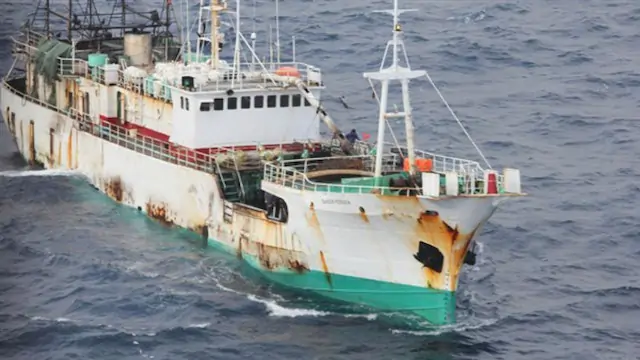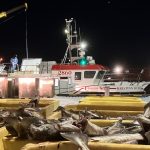A new US report released by NOAA identifies 31 nations and entities engaged in IUU fishing and by-catch.
The 2021 Biennial Report to Congress on Improving International Fisheries Management, identifies 31 nations and entities for illegal, unreported, and unregulated (IUU) fishing activities and by-catch of protected marine life on the high seas, where nations lack conservation measures comparable to those of the United States.
NOAA also identifies Mexico for continued IUU fishing activities, meaning Mexican fishing vessels will be denied entry into US ports and Mexico could face import restrictions on fish and fish products.
This new report, and the underlying identification and consultation process, is one of several tools that NOAA deploys to deter and prevent IUU fishing and support effective international marine conservation.
‘As one of the largest importers of seafood in the world, the United States has a global responsibility and an economic duty to ensure that the fish and fish products we import are caught sustainably and legally,’ said Janet Coit, assistant administrator for NOAA Fisheries, and acting assistant secretary of commerce for oceans and atmosphere and deputy NOAA administrator.
‘IUU fishing undermines U.S. fishermen who operate under the strongest fishery management practices and conservation laws, and NOAA will use every tool to make sure all nations follow the same rules.’
The report identifies China, Costa Rica, Guyana, Mexico, the Russian Federation, Senegal, and Taiwan as having vessels engaged in IUU fishing activities during 2018-2020.
Algeria, Barbados, China, Côte d’Ivoire, Croatia, Cyprus, Egypt, European Union, France, Greece, Grenada, Guyana, Italy, Japan, Republic of Korea, Malta, Mauritania, Mexico, Morocco, Namibia, Portugal, Saint Vincent and the Grenadines, Senegal, South Africa, Spain, Taiwan, Trinidad and Tobago, Tunisia, and Turkey are identified for lacking regulatory programmes comparable in effectiveness to the United States to reduce the by-catch of protected marine life in their fishing operations.
Some nations or entities were identified for both IUU fishing and by-catch activities.
The 2021 Report also announced certification determinations for nations identified for IUU fishing activities in the 2019 Biennial Report to Congress on Improving International Fisheries Management, following a two-year consultation period where NOAA works with each nation to encourage corrective action.
Mexico received a negative certification for IUU fishing activities identified in 2019, which were failing to curb the flow of small vessels fishing illegally in the US waters of the Gulf of Mexico. Failure to remedy these incursions into US waters has resulted in Mexico’s negative certification.
In contrast, Ecuador and the Republic of Korea received positive certification determinations for taking actions to remedy the IUU fishing activities for which they were identified in 2019.
‘We are encouraged by the positive steps certain nations took to address the identified IUU fishing practices,’ said Alexa Cole, acting deputy assistant secretary for international fisheries, and director of NOAA Fisheries Office of International Affairs and Seafood Inspection.
‘NOAA is committed to working with each of the 31 nations and entities identified in this year’s report to strengthen their fisheries management and enforcement practices.’
The report illustrates key ways NOAA improves international fisheries management by: developing law enforcement capacity and best practices to combat IUU fishing, supporting the effective management of protected species and shark catch on the high seas, and ensuring a fair market for the US fishing industry.
Click for the 2021 Biennial Report to Congress on Improving International Fisheries Management









